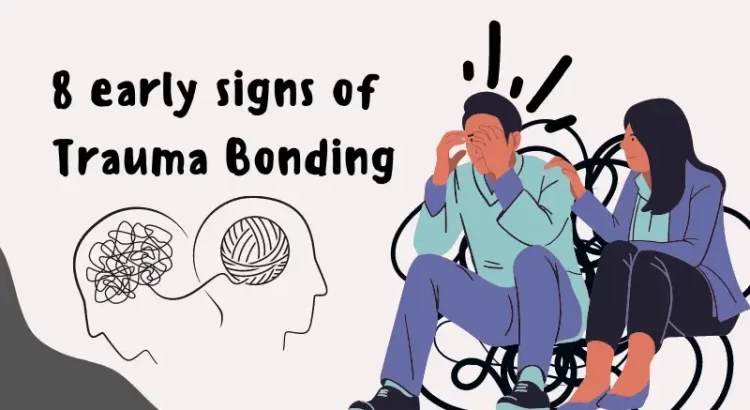Today in this blog we will learn about some early signs of Trauma Bonding because all of us have our respective struggles and different journeys that we have to face.
But The biggest battle that one encounters is the emotional knot that we tie with others. Especially when these knots called relationships turn toxic, nothing is more disturbing than that. In this blog, we are going to discuss one such concept, Trauma Bonding.
It is a concept where you feel attached or connected to someone who’s been causing you either physical or emotional harm.
Usually, such traumas occur in romantic relationships. But it’s not that one cannot detect it. There are several signs faced by those suffering from this condition. Let us look into those early trauma bond signs.
Early Signs of Trauma Bonding

The symptoms and effects of trauma bonding vary from person to person because of their different emotional quotient. Let us go deep into those:
1. Love-Bombing
This concept is a kind of manipulation that one does over the other. In Love-Bombing, a partner will shower the utmost affection and attention on the other companion in the initial phase of the relationship.
The purpose is to influence the person for either negative or positive reasons. When such a situation occurs, the relationship moves at a faster pace in a one-sided manner.
Love-Bombing is the start of an abusive cycle because you get truly attached to the person showering you with such affection and this leads to your negligence towards their toxicity.
Eventually, the sufferer will always feel a scope of change all the time and hope for things to get back to normal. Such an illusion is created in love-bombing.
2. Unable to Step Back
As we read above, in trauma bonding, one starts getting attached to the abuser a lot. This attachment is the root cause of all the manipulations.
The more you get attached, the more difficult it gets for you to leave the relationship despite being traumatized.
It will let you give the benefit of the doubt to the abuser. And, in the end, you will always forgive him or her instead of stepping back from the constant wrong done to you. Furthermore, this attachment issue can also be one of the Signs of repressed trauma in adults.
In this health conditions, a person finds himself strongly attached to the other person and gets upset even with the thought of getting detached, they don’t want to leave the other person for even a short period.
So, if you are suffering from this, consult a mental health expert as soon as possible so that he can help you to get out of this condition.
3. Defensive Towards the Abuser
All the points that we read are so interconnected. The moment one gives benefit of doubt to the other partner (as read above), it is the start of the sufferer justifying the abuser within their head.
Not just that, the one who is facing all these, will ultimately find a loophole to defend their companion’s abusive action or relationship.
In such extreme cases, trauma bonding can also take the form of self-blame, where you accuse yourself of everything that is happening around you.
This will not only bring a defensive attitude but it will also make the sufferer lean towards the positive side: be it moments, gestures, or any other aspects.
Whenever the mind gets worked up, you tend to revive the happy-good-positive moments and further carry on with the relationship.
4. Being Constantly Loyal
Getting extremely attached leads to addiction and the addiction creates a defensive mode. Both of these influence a person to stay loyal.
The fact that the victim starts to self-blame and rationalize the other person’s actions, will ultimately make you loyal.
Despite being traumatized, despite facing toxicity, you chose to stick to your honesty. This is also because the sufferer might feel that if they are loyal, things might change. You start living in a pseudo-reality.
5. Instilling Fear
One of the primal signs of trauma bonding is the imposition of dominance by the toxic partner over the victim.
They begin by taking over you and then gradually increasing the intensity of their dominance. This will make them gain power and authority over you and all of your actions will be undertaken under their influence and according to their wish.
The impulsive anger or aggressiveness that the abuser shows will instill fear within the innocent one.
6. Gaslighting Begins
It is a form of psychological abuse or mental trauma where a person makes the other one question their sanity and perception.
Through this, the bully starts sowing the seeds of self-doubt and chaos within the victim. Gaslighting is a weapon used to win over an argument and more broadly, to hide or cover up your flaws. Such concepts also make the sufferer start blaming themselves.
7. Losing Yourself
The repercussion of all these conditions is hampering self-esteem. At times, people get so attached to their toxic partners that their reliance on them gets at its peak.
The victim starts leaning more over the abuser and begins separating from their own identity.
It will lead to complete emotional dependence on the manipulative companion. Ultimately, you will lose your identity and yourself.
8. Isolation
Among the early signs of trauma bonding, the last phase is that of isolation where a person feels gradually alienated from their close ones be it family or friends. Not just that, their life starts revolving only around the abuser.
He or she starts ruling over the victim, taking all the major decisions of their life, possessing supremacy, and cutting off the sufferer from all the people who genuinely love them.
Hence, all of these were the early symptoms of trauma bonding which can disrupt a person mental health.
So, if you are recognizing any of these signs in yourself, it’s high time to ask for help and consult a mental health expert to get out of these situations because poor mental haelth can affect your overall lifestyle in the long run.
Furthermore, one should also be active and choose to do a workout or some kind of physical activity every day as it is believed that doing exercise benefits mental health.
Conclusion
Now, we have a complete idea of what are the implications of trauma bonding. Mainly, it is a gradual psychological process which we also call an abusive relationship or toxic relationship.
But trauma bonding without abuse too occurs. So, it is good if you go through a trauma bonding test to understand yourself better.
Through this blog, one can get an insight into one major aspect of mental health. But there are many others as well.
People should take care of their mental struggles and that is a priority that many of us undervalue.
To maintain a healthy psychological self, you can practice meditation. What is most important is that one takes out time for themselves and starts feeling your mind and body.
We, hope this blog helped you know about some early signs of Trauma Bonding and if you liked it then do share it with those friends who are stuck in toxic relationships.
